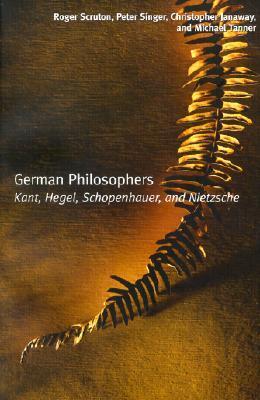
German Philosophers contains studies of four of the most important German theorists: Kant, arguably the most influential modern philosopher; Hegel, whose philosophy inspired a vision of a communist society that for more than one hundred years enlivened revolutionary movements around the world; Schopenhauer, renowned for his pessimistic view that for human individual non-existence would be preferable; and Nietzsche, who has been appropriated as an icon by an astonishingly diverse spectrum of people. Written by leading scholars in the field, German Philosophers is the only work to bring together texts on the four philosophers who represent a central school of German philosophy. With a Foreword by Sir Keith Thomas and extensive notes for further reading, this handy volume serves as an easy-to-use introduction for the beginning philosophy student and a quick and comprehensive reference for scholars.
Author

Sir Roger Scruton was a writer and philosopher who has published more than forty books in philosophy, aesthetics and politics. He was a fellow of the British Academy and a Fellow of the Royal Society of Literature. He taught in both England and America and was a Visiting Professor at Department of Philosophy and Fellow of Blackfriars Hall, Oxford, he was also a Senior Fellow at the Ethics and Public Policy Center, Washington D.C. In 2015 he published two books, The Disappeared and later in the autumn, Fools Frauds and Firebrands. Fools Frauds and Firebrands is an update of Thinkers of the New Left published, to widespread outrage, in 1986. It includes new chapters covering Lacan, Deleuze and Badiou and some timely thoughts about the historians and social thinkers who led British intellectuals up the garden path during the last decades, including Eric Hobsbawm and Ralph Miliband. In 2016 he again published two books, Confessions of A Heretic (a collection of essays) and The Ring of Truth, about Wagner’s Ring cycle, which was widely and favourably reviewed. In 2017 he published On Human Nature (Princeton University Press), which was again widely reviewed, and contains a distillation of his philosophy. He also published a response to Brexit, Where We Are (Bloomsbury).